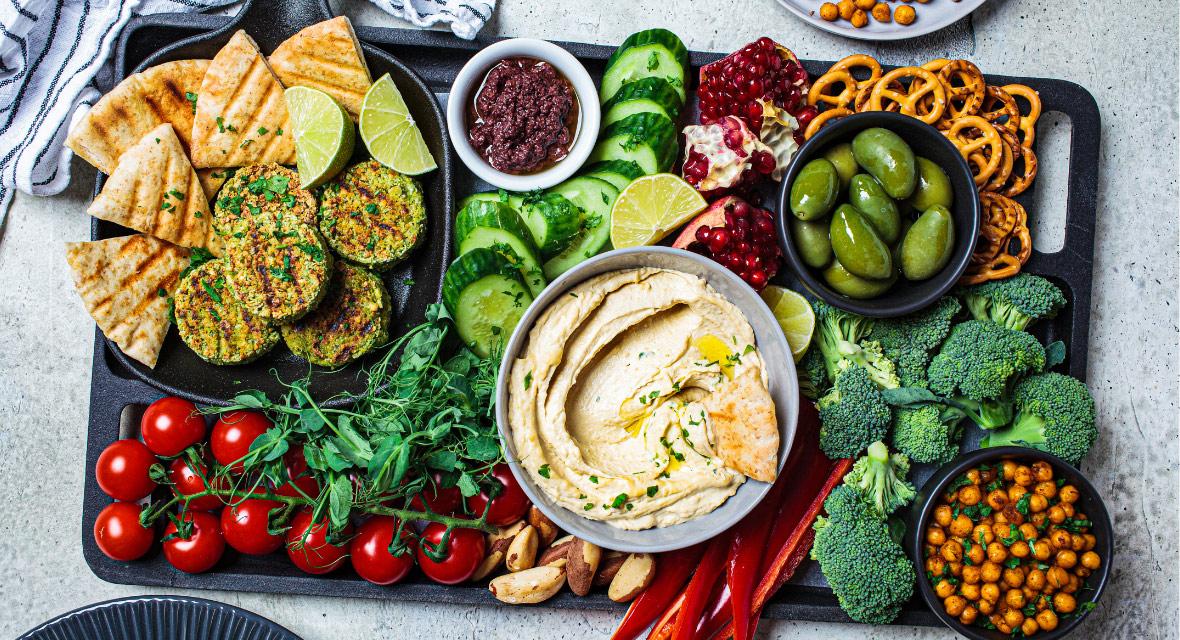🏆 As seen and loved on Shark Tank Dubai 🏆

Is Vegetarian Diet Better for Athletes?
Vegetarian Diet for Athletes
The idea of a meatless diet can be unimaginable for many athletes. Meat has been an indispensable part of a sports persons' diet. The highly strenuous training and strength need to be supported by a high-calorie diet of 6000 calories and 200 gm of protein daily.
Many experts doubt if getting this many calories and protein from a vegetarian diet plan is possible. Some coaches and professionals are skeptical about plant-based diets. They believe that meatless diets cannot provide the necessary nutrients required for optimal training and performance. However, many athletes claim their performance has increased exponentially after switching to plant-based diets.
Since the release of the docu-film "The Game Changer" on Netflix, the debate between meat-free or meat diet for athletes is gaining momentum. The film showed innumerable examples and studies that back the multiple benefits of a plant-based diet plan. We have tried to give you a non-biased opinion about the vegetarian meal plan for athletes. Keep scrolling for all the information, benefits, and side effects of a vegetarian diet for athletes.
What is the difference between vegan and vegetarian diets?
Let's not confuse vegetarian with vegan! Though vegetarianism is predominantly a plant-based or green diet, it is more flexible that allows food derived from animals but not meat—for example, dairy, honey, eggs, etc.
Vegan, on the other hand, follows a strictly plant-based diet. For some followers, a vegan diet is not just about food but a form of lifestyle. People following veganism do not use products that use animals, even medicines tested on animals.
Types of Vegetarian Diets
- Vegan (strict vegetarian): Excludes all kinds of animal products
- Vegetarian: Avoid animal meat, even eggs, but consume dairy products and honey.
- Lacto-vegetarian: Includes milk and dairy products but avoid all other animal-based products.
- Ovo-vegetarian: Includes eggs but not dairy products.
- Lacto-ovo-vegetarian: Includes eggs and dairy products.

Dietary Requirements for Athletes
There is no standard approach or diet chart for athletes. It all depends on the sports that they play and their intensity. They require a higher percentage of macro and micro-nutrients to compete at their optimum level to maintain strength and energy. Where macros concentrate on energy, micronutrients like vitamins and minerals help in faster recovery and enhance performance.
Macronutrients
The three main macros form the building blocks of the human body. They provide energy and help the body to function properly. The three macros that you consume in your daily diet are carbohydrates, fats, and protein. Below is the recommended breakup of macros in an athlete's meal plan.
- Carbohydrates: 45-65%
- Proteins: 10-35%
- Fats: 20-35%
Micronutrients
According to expert nutritionists, athletes can receive an adequate diet if they eat varied food ingredients to increase the variety of minerals and vitamin intake. Some nutritionists also recommend vitamin supplements. However, the quantity entirely depends on personal needs. Essentially, you need to rely on a balanced diet to give you the energy you need to excel in your sports.
Hydration also plays a vital role in an athlete's diet. Proper hydration helps maintain the energy level, keeps you agile, aids in recovery and thermoregulation, and keeps them mentally alert. All of these benefits help improve physical performance and reduce the risk of injuries.
There are no specific dietary guidelines for Arab athletes. Most health institutes in UAE follow Western guidelines. Moreover, if you are an athlete or training to be, it's recommended to work your plans with a sports nutritionist.
Sports nutrition for vegetarian athletes must be created by registered dieticians. They can ensure that you consume enough calories and nutrients to maintain your body weight and optimize performance. You can also devise a separate meal plan strategy for training, event, and recovery period.
From where do vegetarian athletes get their protein?
Protein sources for vegetarians are abundant. Dairy and eggs, along with an exhausting list of plant-based proteins, ensure that you get your protein. It provides the body with the necessary amino acids to help build and repair muscles and tissues.
Ideally, athletes can safely consume 2 gm of protein per kg of their body weight. However, it may vary from 1.2 gm to 2.0 gm from person to person.
Nutritional considerations for vegetarian athletes
Athletes go through regressive physical activity. They must consume all nutrients in appropriate amounts. There is no doubt that nutrition and athletic performances go hand in hand. An athletic meal plan must include protein, omega-3 fatty acids, vitamin D, iron, zinc, calcium, vitamin B12, iodine, and riboflavin in much higher quantities than normal individuals.
All these nutrients are found less in plants, and they do not get well absorbed. That is why the athletes may have to eat frequent meals and healthy snacks and limit the intake of high-fibrous food.
The athletes may need to take additional supplements occasionally to support the deficiency. Your nutrition must meet the correct energy requirements to optimize your training routine and performance.
Why are athletes opting for vegetarian diets?
Even after understanding the side effects of completely vegetarian diets, many athletes are electing to follow vegetarian diets. The reasons are many, such as health, environmental, ethical, eco-friendly, philosophical, spiritual, etc.
A vegetarian diet provides multiple benefits to sportspersons. Many sports legends are either vegetarians or vegans and have shared several times how it has helped enhance their performance. Some of the prominent names are Martina Navratilova, Lewis Hamilton, Mike Tyson, Virat Kohli, Emil Robert Voigt, and the list goes on.
Some of the outstanding benefits of a vegetarian and plant-based diet are:
- Increases blood flow
- Improve muscle efficiency
- Reduce inflammation
- High in antioxidants
- Improves flexibility and agility
- Low in saturated fat
- Increase aerobic capacity
Conclusion
Opting for vegetarianism is no longer considered a philosophical choice but a pragmatic one. Both amateur and professional athletes can benefit from a vegetarian diet. The diet not only provides you flexibility but a more comprehensive range of nutritional benefits compared to a vegan diet.
However, you must plan your diet under the guidance of an expert dietary coach. Be mindful of your food choice. Having crackers with vegan cheese is not the ideal food for sportspeople. Make sure your daily meal plan must include plenty of whole foods and a wide range of fruits and vegetables.
Athletes need to optimize their health and performance, and they can't leave any stone unturned. Switching to a vegetarian diet can bring a whole lot of change. Thankfully, these changes only come with the most advantages.
And there is no confusion that a plant-based diet is the heart of the most healthy and balanced diet. All the successful vegetarian or vegan athletes prove that to be successful in sports, animal products are not necessary.
If you are looking for a tasty vegetarian meal plan in Dubai or across the UAE that delivers right to your doorstep, connect with us. Let our nutritionist design a perfectly customized meal plan for you. Let us work together to optimize your performance and win your next tournament.
Reach out to start your fitness journey with us!
Meal Plans
Delivery Details
Legal Information
© 2020-2026 VMeals. All rights reserved. VMeals™ is a trademark of Flip Side Restaurant and Cafe L.L.C
We accept
